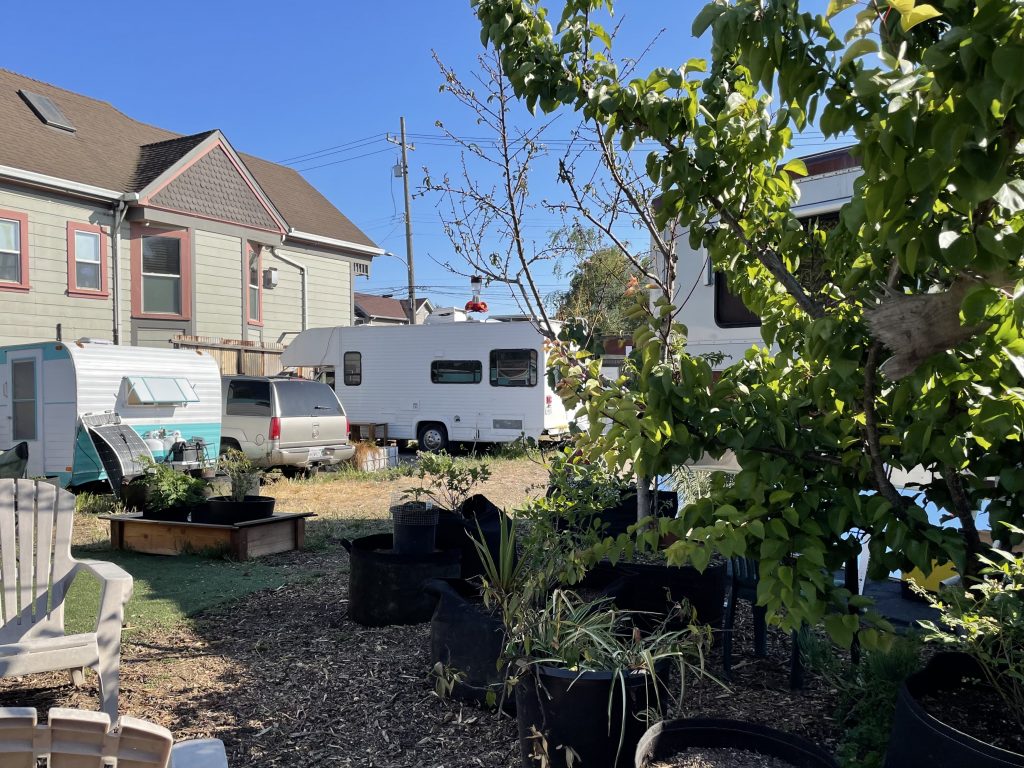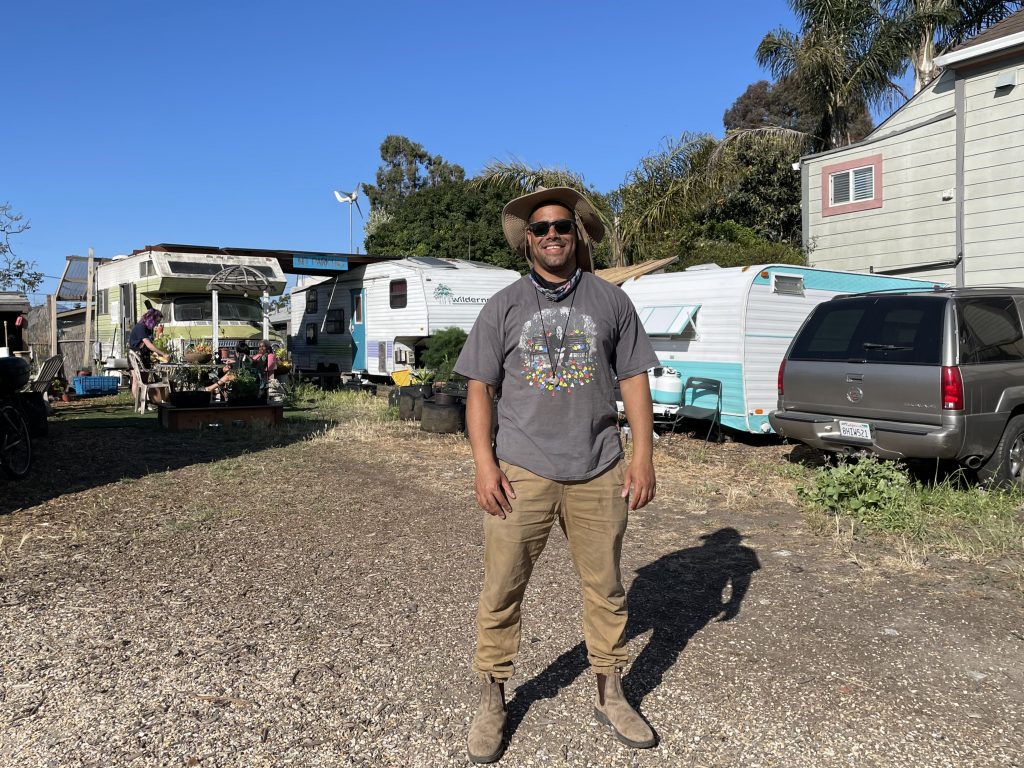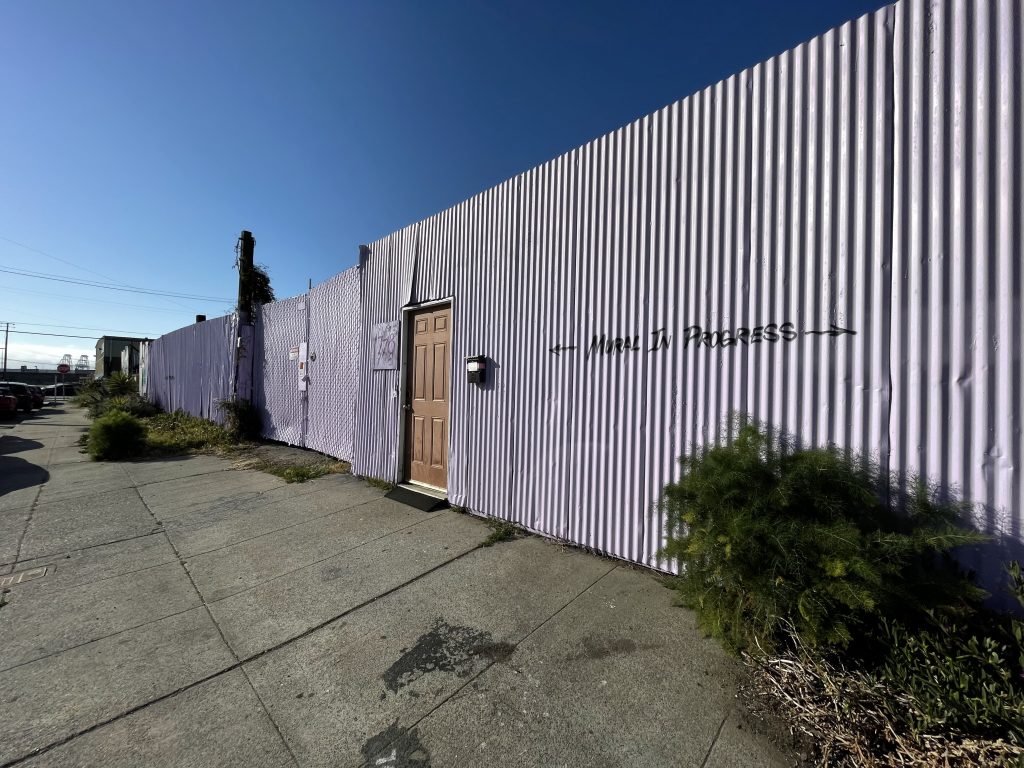
Behind a corrugated metal fence painted powder purple near 10th and Wood Street in West Oakland, the residents of a small unsanctioned solar-powered RV eco-park housed themselves cheaply for years. But soon, the city could shut them down. This is one of a handful of RV communities that the City of Oakland has recently targeted as “blight,” a term that can be broadly interpreted as the aesthetic of poverty or urban decay. According to the city, these laws are meant to prevent a “fire hazard or a condition considered dangerous to public health, safety, and general welfare.” But the other important purpose of these laws is to protect property values.
The people who live at this West Oakland eco-RV park don’t call themselves homeless. Many residents have chosen to stay here in order to save money and live more sustainably, or as founding resident Adam Garrett-Clark says, to live “light on the land and light on the pocketbook.” Other residents have found it a safe haven after experiencing homelessness or veering dangerously close to it. Under blight laws, living in an RV or tiny home on private property without a special occupancy permit is considered illegal under most circumstances. Over the last several months, the city has used these laws to issue the property owner up to $5,000 in fines for violating its housing habitability and land use laws. For this low-income community, the fines are tantamount to eviction and could land people on the street.
Adam Garrett-Clark, 38, leased the site from the landowner in 2015. This is not his first time building up a community of small, non-traditional homes. He describes himself as a tiny house advocate, and while he currently lives in a small apartment with his girlfriend, he has resided in RVs and tiny houses for well over a decade, and traveled the country visiting tiny home communities. Along with two others, he also runs a small business called Tiny Logic, which builds ADUs for private clients. So when he was forced to move his vehicle from a different West Oakland lot in 2014, he went looking for another place to set up a community.
Because he took out the lease in his name, he also took on the administrative duties involved with collecting rent from the other tenants and maintaining the site, though he says he makes no profit from the leadership role. Recently, Garrett-Clark started a 501c3 called Neighborship in order to better manage the RV community. Garrett-Clark has described Neighborship as a housing cooperative, but the people who live there are fitted together more loosely, like an archipelago. Most of the tenants are brought in by Garrett-Clark. While the residents don’t necessarily choose each other, that doesn’t mean there isn’t a shared culture. Like him, most are oriented toward issues of economic equality and social justice, and sometimes feel compelled to help each other.
There are currently five tenants who live full time at the RV park. The site has held anywhere between three and thirteen people at one time. Currently, each tenant pays $600 a month. Each resident comes with their own RV, which they hook up to the lot’s municipal water supply. The group also uses a system for draining grey water, compliant with California’s greywater code. Some units have their own shower. There is also an additional outdoor shower made of plywood. Because it is a soil lot, they are able to dispose of their waste water very cheaply.

For bathrooms, the group rents a port-a-potty, which costs the group $200 a month. This is much cheaper than fitting sewer lines for each unit, Garrett-Clark explains, which would cost upwards of $50,000. For cooking, extra propane tanks are stored in a steel cage located on an area of the property that is paved. For electricity, every unit generates its own via a closed-loop solar system.The RV park was previously an auto junkyard. The city tested the soil, which was found to contain high levels of heavy metals, so residents added a layer of wood chips to act as a barrier between those contaminants and themselves. The wood mulch in addition to the many planters that dot the site give the place a farm feel. That, and the fact that most days of the year, the lot is drenched in sunlight. It is bordered on its east side by a two-story Victorian, but on its other three sides it is bordered by either the street, other vacant lots, or neighbor’s backyards.
26-year-old Isaia diGennaro has lived here for about three months. They say they’re receiving financial help from two San Francisco nonprofits: Lyric, which serves trans youth, and the SF LGBT Center. The latter organization helped them purchase their RV. “Ironically, living in an RV is the most permanent place I’ve lived for a while,” they said. diGennaro says this environment has given them an opportunity to mentally recover after being precariously housed, jumping from one form of temporary housing to another. “Since COVID started, this is my seventh time moving,” they said. “I don’t have a good relationship with my family. I don’t have anyone who I can go back home to, so I was just bouncing from place to place.”
Garrett-Clark’s’s elderly mother, Sauda Garrett, recently moved in as well. She settled in his trailer after a family member she was staying with caught COVID. Sauda spent most of her adult life in the Bay Area where her son was born and raised. In the late 70s and 80s, she worked at various non-profits benefiting women and children. She also taught in Oakland public schools. She spent the latter part of her life on the East Coast, but came back to Oakland to stay with her daughter during the coronavirus pandemic.
“It’s not the Oakland I know. I got back here and saw hundreds, maybe thousands of people living on the streets,” she says. “I was speechless. It literally brought tears to my eyes… It wasn’t a perfect place, but we cared about each other. We appreciated each other’s differences. You could make a way here, and now it’s impossible, or so it seems.”
Residents say Neighborship was especially advantageous during the pandemic because living anywhere else on a budget of $600 would have almost certainly meant sharing an apartment or even splitting a room, putting them at greater risk of contracting the virus. Each RV is spaced at least 10 feet apart which acts as a fire break, but it also gives each resident some privacy, something in limited supply when sharing a small apartment.
Garrett-Clark says dozens of different people have lived here over the past six years. Over that time, the tenants and their RVs have managed to evade the attention of the city’s code enforcers. In 2016, he says a code enforcer who came to inspect a neighboring lot took notice of their site. He convinced him to look the other way because no one had complained about their community. According to public records, Garret-Clark received a Zoning Clearance to rent garden space on a monthly basis to members of the “Detritus Neighborship Community Garden.”
However, in the last 18 months, an disgruntled neighbor filed multiple complaints with the city. According to public records, a total of three complaints have been filed against Neighborship. All complaints filed to the city of Oakland are anonymous to the public. The earliest complaint dates back to October of 2019. It suggests that their outdoor shower was accumulating water, but it wasn’t until the summer of 2020 that the city sent an inspector to check. This time, it was a different code enforcer who reached out to the landowner. But the property owner was recovering from an aneurysm at the time, so many months had passed before Garrett-Clark heard about the violations. Two further complaints were made in March of this year. One complaint warns of an imminent fire risk, urging city officials to “Please get them out of here before we have the next Ghost Ship fire,” referring to the 2016 fire at an informal dwelling space in an East Oakland warehouse which killed 36. (Garrett-Clark says the Fire Department has informally checked for fire hazards on a few occasions and found no problems; as of this writing, OFD has not responded to our request for comment or public records request.)

Residents expect that all three complaints were written by the same person, Scott Olsen, who owns a home next door. Olsen declined to be interviewed for this story, but he made an appearance on NBC Bay Area’s six o’clock news on April 26 and told reporter Melissa Colorado that he had lodged multiple complaints to the city against the eco-RV park. In that interview, he spoke about the smell of the port-a-potty and the presence of an outdoor shower near his home’s foundation.
Street Spirit spoke with several neighbors near the RV park. Some declined to be interviewed for the story. Others agreed to speak on the condition of anonymity because they feared retaliation from Olsen. However, everyone who spoke said the same thing: that the RVs should stay. Multiple neighbors, mostly longtime homeowners, said the people at the RV park had caused them no trouble. Some felt what they were doing was borne of necessity because housing in Oakland has become so expensive. One neighbor said they felt the underlying issue was really a personal dispute between Garrett-Clark and Olsen, which should have been settled interpersonally.
Multiple neighbors said they would rather have the RV park in the empty lot than another encampment, citing issues they had with an encampment on a nearby lot in the past.
Catherine Winfield, a young homeowner on the opposite end of the block, who bought her house three years ago, hypothesized that the complaints came from a housing developer. A brand new four-bedroom home at 1014 Pine Street is being sold by the Winkler Real Estate Group for an asking price of $899,000. She said there is a perception held by some homeowners that an RV park nearby would have a negative impact on their property values. Of the city’s cracking down on the RV park, Woodfield said, “I feel it’s not a great use of city resources. I mean, of all the places they could be focusing, there are far, far worse situations. Maybe go focus on places where people are needing more help. These folks don’t seem to need that from the city.”
The Neighborship lot is zoned for industrial use. Even if the lot were zoned residential, the city’s blight code prohibits people from living permanently in their RVs on any piece of private property. Even if Garrett-Clark owned the property, that would make no difference. He has appealed the $5,000 in fines that the city has levied against his landlord. For now, that means this community can stick around a little longer, but exactly how long is hard to say.
Darin Ranelleti, Mayor Libby Schaaf’s Policy Director for Housing Security, told Street Spirit that Mayor Schaaf and Councilmembers Dan Kalb and Sheng Thao are proposing an ordinance to promote cost-effective construction and expanded housing options, and will address RVs, tiny homes and alternative building materials. The ordinance is scheduled to be reviewed by Oakland’s Planning Commission on June 2. “I met with Adam and learned a lot about his site; it was very informative for the ordinance,” Ranelleti said.
Their proposed housing ordinance hasn’t been released yet, but Garrett-Clark says he’s had a chance to review parts of the proposal. It may not help much. He says the success of Neighborship is its ability to keep costs low, and “a lot of what it looks like these laws are going to do is require [landlords] to overcharge [RV tenants] to cover their costs to set these things up.”
For many at Neighborship and in outdoor communities across Oakland, this could make the difference between living on vacant lots, separated from the street by corrugated walls, and the sidewalk.
A previous version of this article misspelled Catherine Winfield’s name as “Katherine Woodfield.” We regret the error.
